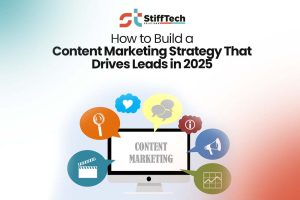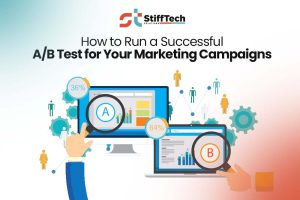
How to Use DeepSeek for Digital Marketing
The rise of AI has transformed the way businesses approach digital marketing. Tools like DeepSeek make it easier to analyze

You’re about to create a content marketing strategy. It’s 2025, and you need a solid plan to drive leads. The landscape in 2025 is driven by smarter search trends, personalization, AI-assisted content, and deeper audience insights. As competition grows and user expectations evolve, brands need a powerful and future-ready content marketing strategy to generate quality leads.
Content marketing in 2025 is no longer just about writing blogs or posting on social media. It’s about delivering meaningful experiences across multiple platforms, search engines, social networks, email, video platforms, and even AI-powered search tools. With users consuming content in diverse formats, brands must integrate storytelling, data-driven insights, and personalization into their strategy. This approach makes content marketing a core driver of lead generation and complements broader digital marketing initiatives.
The foundation of an effective content marketing strategy is having clear, measurable goals. Are you aiming to generate email leads, increase demo bookings, drive product trials, or boost inquiries? Once your lead goals are defined, align your content formats accordingly. For example, ebooks and webinars are ideal for B2B content marketing, whereas product guides and comparison blogs work well for B2C.
In 2025, audience research goes far beyond basic demographics. Because you’re creating a content marketing strategy, understanding your target audience is crucial. You need to know who they are, what they want, and what problems they’re trying to solve. You’re looking for information about their demographics, interests, and behaviors. This helps you create content that resonates with them. You’re trying to identify their pain points and create content that addresses these issues. By doing so, you’ll be able to connect with your audience and build trust. You’ll create content that’s relevant and valuable to them, which is essential for a successful content marketing strategy.
As you develop your content marketing strategy, setting clear goals is crucial to measuring success and staying on track. You’ll want to define what you’re trying to achieve, whether it’s generating leads, driving sales, or increasing brand awareness. You’re creating a roadmap for your content marketing efforts, so make sure your goals are specific, measurable, and attainable. Consider what you want to accomplish in a set timeframe, and prioritize your objectives. By doing so, you’ll be able to focus your efforts and allocate resources effectively, which will help you drive leads and grow your business in 2025.
SEO in 2025 is driven by search intent, personalization, conversational queries, and AI-powered search engines. To attract quality leads, target keywords that reflect strong buying intent. Use keywords like “best,” “vs,” “pricing,” “solutions,” “benefits,” and “how to choose” to create content that speaks directly to users ready to make decisions. Regularly update your content to match search trends and competitor performance.
A winning content strategy isn’t limited to long-form blogs. Diversifying your content formats increases your reach and improves engagement. In 2025, video continues to dominate, while short-form content and interactive content also drive conversions. Use a mix of:
As you delve into content marketing, developing a unique value proposition is crucial because it sets your brand apart from competitors and helps you connect with your target audience. You’ll want to identify what makes your brand unique and communicate it clearly. This involves understanding your customers’ needs. You can then tailor your message to address these issues, showcasing how your brand can provide solutions. By doing so, you’ll create a compelling value proposition that resonates with your audience and drives leads. It’s essential to craft a clear, concise message that differentiates your brand.
AI tools help you research topics, create content drafts, analyze competitor strategies, and measure performance. Use AI-driven analytics to identify which pieces of content bring the most leads, and replicate that success. Predictive analysis can help you discover trending topics before competitors and refine your publishing schedule.
You’re now creating a content calendar, which helps you plan ahead and ensure consistency in your content marketing efforts. By setting deadlines, you’ll be able to organize and schedule your content in advance, saving you time and reducing stress. You’ll find that planning ahead and setting deadlines enables you to stay on track, meet your goals, and make adjustments as needed to optimize your content strategy.
Publishing content is not enough, you must amplify it. Share your content through email marketing, LinkedIn, Facebook groups, niche communities, and paid promotions. Repurpose blog content into short videos, carousel posts, and email snippets to increase visibility. Consistent promotion ensures your content reaches the right people.
Set clear KPIs such as lead conversion rate, form submissions, sign-ups, demo bookings, and cost per lead. Use tools like Google Analytics 4, HubSpot, Ahrefs, or SEMrush to track performance. Regular content audits help remove outdated pieces and enhance high-performing ones. Optimization is an ongoing process that keeps your strategy relevant and effective.
Building a content marketing strategy that drives leads in 2025 requires a smart blend of research, creativity, personalization, and consistent optimization. You’ve learned to understand your audience, set clear goals, and create a unique value proposition. Now, you’ll leverage social media, measure performance, and optimize for search engines. You’ll repurpose content and stay up-to-date, ensuring your strategy keeps driving leads and achieving your marketing goals.
Content marketing builds trust, educates users, and positions your brand as an authority. This attracts high-quality leads and helps nurture them across the buyer journey.
Ebooks, blogs, case studies, videos, and webinars perform strongly. They help move users from awareness to decision-making stages effectively.
Most businesses benefit from publishing 4–8 high-quality pieces per month. Consistency matters more than volume.
Yes, SEO is crucial for long-term organic lead generation. Intent-based keywords and updated content help you rank and attract qualified prospects.

The rise of AI has transformed the way businesses approach digital marketing. Tools like DeepSeek make it easier to analyze

You’re about to create a content marketing strategy. It’s 2025, and you need a solid plan to drive leads. The

You’re about to launch a marketing campaign. To ensure it’s effective, you’ll want to run an A/B test. You’ll need